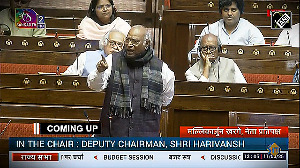After facing flak for employing unscrupulous means to recover bad loans, banks and financial institutions have now undertaken the task of educating consumers on proper use of credit and providing debt management solutions to distressed customers.
Banks such as ICICI Bank, the country's biggest private sector lender, and Bank of India have already launched such specialised financial counselling initiatives.
Bank of India's counselling scheme is called Abhey, while ICICI Bank has named its initiative as Disha.
Disha, launched last year, has set up base in New Delhi, Mumbai, Ahmedabad, Ludhiana, Kanpur and Hyderabad.
"We plan to expand Disha network to 20 cities by year-end," ICICI Bank's Senior General Manager, Service Quality, B Madhivanan said.
Modelled on practices in developed economies, these initiatives involve educating people on proper use of consumer credit. They also offer debt management solutions to distressed customers, thus avoiding the need to take unpleasant measures to retrieve loans from defaulters.
There have been several directions by the National Consumer Commission, the apex court hearing cases under the Consumer Protection Act 1986, to private and multi-national banks to desist from resorting to 'instant justice' -- by way of engaging loan goons and thus for assaulting the defaulters.
Stressing that it was a free and neutral industry-wide service -- without any tacit purpose of promoting the ICICI brand, Madhivanan said, "Most counsellors are volunteers and are not on our rolls. The service is free and available to customers of all banks."
The initiative serves as an important safety valve outside a bank's set-up for debt settlement, Madhivanan said, adding, "its credibility is being built with every case."
Apart from working with the Bank of India, Disha is also closely associated with nodal officers of Citi Bank and Standard Chartered Bank, he said.
Bank of India's general manager D Krishnamurthy described Abhey as a grand success.
"The gains from the experiment are very satisfying, especially in the backdrop of the recent incidents of farmers falling into debt traps and triggering a wave of suicides in rural area."
He agreed that the concept of promoting financial literacy has its origin in the West where banks collectively invest heavily in educating consumers as it helps reducing delinquency in loan repayment.
"But we have conditioned it according to the peculiar conditions here which involve a peculiar mix of rural and urban customers with varying debt management needs," he said.
We have four centres including those at Mumbai, Chennai and Nagpur and the chain is likely to expand soon, Krishnamurthy said.
A volunteer from New Delhi centre of Disha, Nutan Lugani, said, "A lot of counselling material has been drawn from literature on financial literacy released by RBI's customer service division."
The initiative offers a win-win situation for both consumers and the banks.
"From a consumer's perspective, we help him assess his liability and paying capacity and then suggest a model for emerging out of a debt trap," she said.
"The banks gain by getting their money back and even by narrowing down on habitual defaulters who need serious help for getting out of debt traps," Lugani added.






 © 2025
© 2025